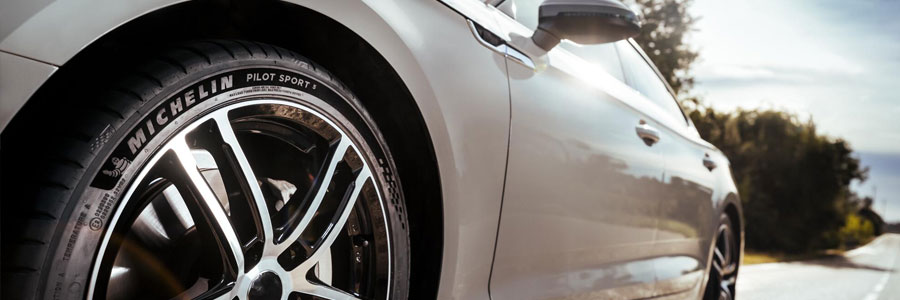Do your car a favour and check your tyres

No matter what you drive, Ford or Ferrari, there is one inescapable fact that holds true for all: the only thing connecting you to the road are four little patches of rubber. Unless you drive a Reliant Robin, but that's not for us to judge. Whether it's a trusty old runabout or an Italian supercar you need to make sure your tyres are up to the job of keeping you on the tarmac.
Worn, damaged, or incorrectly inflated tyres can all have a massive impact on whether your journey ends pleasantly, or in a ditch. It should really go without saying but checking your tyres regularly can save lives.
Likewise, understanding the characteristics of your tyres can make a difference too.
Fitting low profile tyres to your car may improve the looks, and if you're driving something sporty the extra grip more than compensates for the stiffer ride and increased road noise. But did you also realise that the very thing that makes low profile tyres so popular also causes them to wear faster?
Low profile tyres offer more grip because they have more contact with the road due to larger tread widths, and more contact with the road means more wear and tear to the tyre. Low profile tyres also have softer compounds to enhance their performance but that also means they are more prone to damage. And that's before we even get to the fact that low profile tyres tend to be fitted to faster cars, and faster cars tend to be driven faster because that's the whole point. Fast corners and late braking make for an exhilarating drive but they do tend to eat through tyres.
And then there's the ever-growing number of people choosing an EV.
You might be tempted to stick any old car tyre on your eco-friendly car but that could be the worst thing you can do. All those batteries make EVs heavier than their petrol or diesel equivalent and the additional weight on a standard tyre can completely change the handling of the car.
Tyres for electric vehicles not only have to compete in terms of cost, durability, and grip, they also face a whole load of other challenges too. They need to be more aerodynamic to make the most of the car's range, be stronger to cope with the extra weight, be quieter because there's no engine noise to drown out any tyre rumble, and be as light as possible because every bit of weight added to the car reduces the range and performance.
It's not as if keeping an eye on your tyres is hard either.
Minimum legal tread depth is 1.6mm across the centre of the tyre. Stick a 20p piece into the tread and if you can see the outer band on the coin your tyres are illegal and need replacing. It's such a simple test you can easily do it once a month.
Tyres are never manufactured with lumps and bumps, or with nails, thorns, or any other foreign objects sticking in them. If you see something stuck in your tyre tread, dig it out before it does any damage, and if you notice any lumps or bulges book it in straight away to get the tyres checked.
And most importantly of all, check your tyre pressures regularly. Not enough air and your tyres will suffer premature wear on the outer edges, you run the risk of damaging the wheel rims, or even worse they could suffer from sudden and rapid deflation. If that happens at speed the consequences can be enormous. Over-inflation results in a less comfortable ride, a reduced area of contact with the road giving less grip, and accelerated wear on the centre of the tyre.
If you're driving a fairly new car there's an excellent chance it's got tyre pressure sensors and will warn you if the pressures are incorrect. Don't ignore those warnings. If you don't have pressure sensors, you can check your tyres at a fuel filling station or even invest a few pounds in a pressure sensor and check them at home.
As long as you're checking your tyres on a regular basis you'll ensure your car stays on the road. And if that's not a good enough reason you'll also save yourself money because properly looked after tyres will need replacing less often. And cost you less in fuel - be it petrol, diesel or electricity.
Make sure you can replace your tyres
If you take out a maintenance agreement with your car lease, then tyre replacement is included - whether it's due to wear or a puncture. Read what you get with a maintenance agreement here - and get extra motoring peace of mind.
View our latest blog posts

Categories
Pages
We are a family run business based in rural Worcestershire. Our team of 38 staff are on hand to provide an exceptional service to personal and business customers.
Read More
